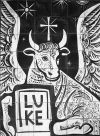
THE GOSPEL OF LUKE
Galilee and Nazareth: Lk 4,14-21
Jesus returns to Galilee: 4,14-15
Luke in 4,13-14 like Mark in Mk 1,14-15 tells us that Jesus returned to Galilee. Otherwise the two gospels are different about the return because Mark puts his stress on Jesus preaching the kingdom of God while Luke stresses Jesus acting in the power of the spirit. Luke has also dropped the call to repentance in Mark. He goes straight to Jesus' teaching.
I regard those two verses in Mark as a hinge, closing the prologue and at the same time opening the ministry. The same could be said of Luke 4,14: the stress on Jesus filled with the power of the spirit is a reminder that Jesus full of the Spirit (4,1) has just overcome the devil. At the same time, the two verses point forward to Jesus proclaiming in the synagogue in Nazareth that the Spirit of the Lord is upon him (4,18).
Reports of Jesus's activity spreading through all the countryside are echoed in the references I gave to 4,37, 5,15 and 7,17
In 4,15, Luke speaks of Jesus teaching and this will be a common theme, 4,31 for example. The initial response is favourable, he is praised by all.
Now return to the main page
Jesus in Nazareth: Lk 4,16-30
In Mark 1,16-20, the first thing Jesus does after his return to Galilee is to call four disciples. Luke has postponed this call until chapter 5 (5,1-11) as we saw in the overview,
Jesus returns to Galilee and immediately goes home where he gives a sermon in the synagogue. The first part of the sermon (4,16-21) is a programme as we will see in the next section. This is a keynote speech. The second part (4,22-30) is similar to Mark with the rejection of Jesus by his own people. Luke has therefore given greater substance to the scene in the Nazareth synagogue so that it now becomes the announcement of Jesus' programme as well as the rejection by his own people
We now return to the main page to see this in more detail.
The Sermon Begins: 4,16-21
Verse 16 notes that it was the custom of Jesus to go to the synagogue on the sabbath. It is important for us to remember that Jesus was an observant Jew and much of his ministry was based in the synagogue (e.g. 4,31).
The quotation from Isaiah is highlighted by the frame: in verse 17 he takes the scroll and unrolls it; in verse 20 he rolls it up and returns it.
The prophet Isaiah was a favourite among early Christians. The reading of Jesus is somewhat selective. Giving a letter to each line of the verses in Isaiah chapter 61, the quotation is: 61a, b, d; then 58,6d and 62,2a. The result is to remove anything which is not concrete. Thus there is no reference to the brokenhearted (61,1c) but instead from 58,6 there is the promise of release of captives. Jesus in Luke is practical. Thus he says "blessed are the poor" (6,20) whereas Matthew has "blessed are the poor in spirit" (Mt 5,2). Isaiah's concerns were with the people and their return from exile in Babylon. Here Jesus applies the quotation to himself.
The poor are a major concern for Luke. The theme is present already in Mary's song of praise (1,24). When we come to the Beatitudes (6,20) we will see that Luke says simply "poor" whereas Matthew speaks of "poor in spirit" (Mt 5,5).
The year of the Lord's favour in verse 19 refers to the Jubilee year. In modern terms, we could say that every fifty years the people of Israel were to return to their default state. All debts were cancelled, the fields lay fallow as can be seen in Leviticus 25. In Jesus someone special is now present amongst his people, something new is happening, something similar to a year of Jubilee as the people are recalled to their original values.
Jesus sits down in verse 20, that is a teaching posture (verse 15). His announcement of fulfillment follows in verse 21 and this fulfillment is in his own person. Jesus' claim that the scripture is being fulfilled brings his opening words to a climax.
It is a fulfillment which is "today". Ps 95 is the Church's daily call to worship and it is today that we have to listen to his voice (Ps 95,7). The stress on "today" is there as the angels announce the birth of the child (2,11) and as salvation comes to Zacchaeus (19,9) and to the thief on the cross (23,43).
Now return to the main page
The Sunday Gospel: 3rd Sunday OT
This Sunday Gospel needs to be read with care because it has two separate parts: Lk 1,1-4 & 4,14-21. There is no indication that three chapters separate the first paragraph from the rest of the reading. The link between the two parts would be the theme of fulfillment. The events that have been fulfilled among us (1,1) are uniquely fulfilled in the person of Jesus (4,21).
The second part of this episode (4,21-30) will be read on the 4th Sunday with the overlap of verse 21. We can consider there the consequences of the split reading.
The books of Ezra and Nehemiah are the only record we have of the life of the Jewish people after their return from exile in Babylon. The reading from Nehemiah also picks up on the theme of fulfillment as the Book of the Law is proclaimed before all the people and became present among them. The response to the Psalm makes the point: "your words are spirit, Lord and they are life".
Now return to the main page
